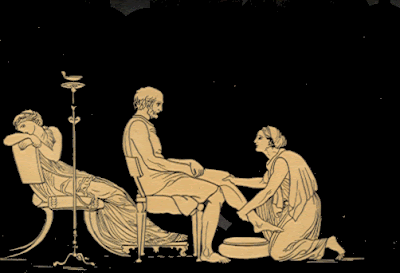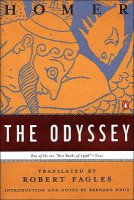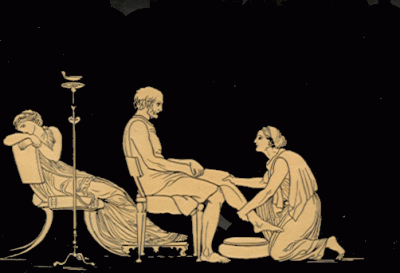The Odyssey is structured around repeated dramas of (mis)recognition: who is he? what is this? who am I? But no recognition scene is more crucial than the one in which Odysseus finally reveals himself to his son Telemachus. For this is always more a story about fathers and sons than it is about husbands and wives.
Penelope is at best a foil: her task is to keep a place open for the rightful head of the household, and therefore to fend off the suitors' attempt to fill the void left by her husband's long absence. But by the time that Odysseus returns, Telemachus finally has a claim to that spot, as is shown by his curt treatment of his mother in Book One: "So mother, / go back to your quarters. Tend to your own tasks, / the distaff and the loom [. . .] As for giving orders / me will see to that, but I most of all: / I hold the reins of power in this house" (1:409-414). The irony, of course, is that it is precisely by tending to "the distaff and the loom" that, in the long span during which Telemachus has been growing up, Penelope has in fact surreptitiously been holding the reins of power--or rather, preventing anyone else from taking them up.
But by Book Sixteen, Odysseus is back and ready (or as ready as he will ever be) to take his place and reassert order in what has become a household turned upside down, in which the guests have abused the code of hospitality by which Greek society is shown to cohere. The suitors have to be killed because they have confused the roles of host and guest. Odysseus will be the unwanted guest, the beggar at the threshold, who asserts his right to host--and to deny hospitality.
Telemachus, however, takes some persuading that his father has returned. Though Athena returns Odysseus to his former appearance (perhaps making him look still more like the younger man who originally embarked to war against Troy: "taller, supple, young" [16:197]), the son assumes that his transformation indicates divinity: "this must be some god [. . .] surely you are some god who rules the vaulting skies!" (16:202, 206). Even after "long-enduring" Odysseus clarifies twice--"No, I am not a god [. . .] No, I am your father" (16:209, 212)--his son continues to be skeptical. "No, you're not Odysseus! Not my father! / Just some spirit spellbinding me now [. . .] you seem like a god who rules the skies up there!" (16:220-21, 228). It is only after our hero repeats himself once more that Telemachus finally accepts that his father has finally returned.
What then? How does one treat a man, as opposed to a god? If the poem repeatedly confuses the distinction between divinity and humanity (if a son cannot recognize his father, who can be sure who is what?), then what is the key difference?
The answer is simple: you ask a man to tell you his story.
As soon as Telemachus has it clear in his mind that he is dealing with his father rather than a god, he comes out with all sorts of questions: "What sort of ship, dear father, brought you here?-- / Ithaca, at last. Who did the sailors say they are? / I hardly think you came back home on foot!" (16:252-54). And these questions echo the queries put to Odysseus by the loyal swineherd, who never doubted that the man before him (even if he didn't recognize him) was a mortal like himself: "Who are you? where are you from? your city? your parents? / What sort of vessel brought you? Why did the sailors / land you here in Ithaca? Who did they say they are? / I hardly think you came this way on foot" (14:215-19). In turn, these questions also echo the myriad queries made of any guest throughout the epic. Nestor to Telemachus: "Strangers--friends, who are you? / Where did you sail from, over the running sea-lanes?" (3:79-80); the queen of the Phaeacians to Odysseus: "Who are you? Where are you from? / Who gave you the clothes you're wearing now? / Didn't you say you reached us roving on the sea?" (7:274-76). And so on and so forth.
Men tell stories. They tell stories about themselves, their ships, their crewmates, their clothes. And of course they also tell stories about their exploits, their families, their gods. This is how they reward the hospitality they receive. More importantly, this is what makes them human. And there is nothing more human, then, than the Odyssey itself: one long story about men, ships, crewmates, clothes, exploits, families, and gods.
The gods themselves do not tell stories. The appropriate reaction to a god is not to elicit narrative, but (as Telemachus makes clear) to make them promises of gifts and sacrifices: "Oh be kind, and we will give you offerings, / gifts of hammered gold to warm your heart" (16:207-8). Men tell stories about gods; the gods accept sacrifices from men.
So stories--discourse, narrative--are essential to human intercourse. No wonder every guest is asked to tell his tale. And in an oral culture, he tale told is all the more important: it is the performance of narrative that assures our humanity. But at the same time, the recognition that performance can also be "only" an act, a tall tale, a means of deception, provokes great distrust and ambivalence. Odysseus, after all, tells great stories. But even after insisting to the swineherd that he "hate[s] that man like the very Gates of Death who, / ground down by poverty, stoops to peddling lies" (14:182-83), he goes on to tell the most elaborate of whopping falsehoods about "hail[ing] from Crete's broad land" (14:228).
Tale-telling is what makes us human, and how we relate to each other as humans, but it is also inherently unreliable, untrustworthy.
It is no surprise then that the only two characters who recognize Odysseus on their own account are either strangers to language (the master's loyal dog; 17: 330-31) or do so by reading some rather more material sign. The old nurse, Eurycleia, is washing her former charge down when "in a flash, she knew the scar" (19:445) left on his knee by a boar many years earlier. Eurycleia reads Odysseus's body directly, and as such is the only human to sound out the truth before the king himself makes himself known to them.
The mark on the body, a sort of primitive writing of injury and affect, shows up the precarious humanity of the tall tale that is The Odyssey itself.




